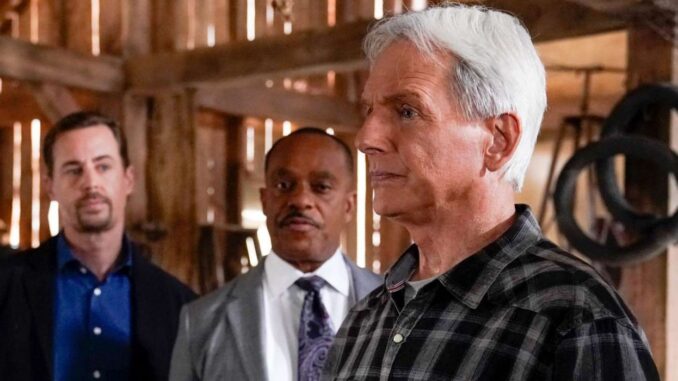
The mahogany desk, polished to a mirror sheen, reflected not just the flickering lamplight but a phalanx of ghosts. Each grain in the wood, every silent tick of the grandfather clock, seemed to echo with the silent weight Gibbs carried. It was a weight composed of two things, inextricably linked: too many partners, and too many secrets. And as the night wore on, pressing in with the silence, Gibbs felt the meticulous edifice of his control begin to tremble.
Too Many Partners:
Gibbs had never been a man who walked a solitary path, not truly. His life had been a grand, often cacophonous, procession of alliances forged and broken, hearts won and lost, adversaries turned into reluctant collaborators, and protégés shaped in his own image. Each of these individuals – the whisper of a forgotten lover, the stern gaze of a mentor long since passed, the phantom grip of an adversary he’d outmaneuvered – was a partner in the vast, sprawling narrative of his existence. They weren't just names in an old address book; they were tendrils, some silken and warm, others barbed and cold, all inextricably woven into the fabric of his present.
There was Amelia, whose ambition had mirrored his own, their pact sealed over stolen glances and whispered promises. There was Thorne, the gruff general whose trust Gibbs had painstakingly earned, only to exploit it for the greater good (or so he’d told himself). There was the young prodigy, Elena, whom he’d plucked from obscurity and polished into a diamond, knowing full well the compromises she’d have to make. And countless others – investors, politicians, informants, enforcers. Each partnership, no matter how brief or profound, had left an indelible mark, a resonance in his memory, a lingering obligation, or a potential threat. They were a legion, a chorus, and sometimes, a clamor, in the quiet chambers of his mind. He had accumulated them like rare artifacts, each one exquisite, but together, an overwhelming collection threatening to collapse the very shelves they rested upon.
Too Many Secrets:
And with every partner came a secret. Not always grand conspiracies, often, but quiet omissions. Small betrayals. Necessary evils. Hard truths swallowed whole. Each relationship had its unsaid things, its hidden compartments in Gibbs’s meticulously organized mental library. For Amelia, it was the truth of the deal that had ruined her rival. For Thorne, the knowledge of a strategic leak that had saved countless lives but cost a handful of reputations. For Elena, the dark secret of her own past, which Gibbs held like a loaded gun, ensuring her loyalty.
These secrets weren’t inert archives; they were living things, each demanding careful tending, each a potential pressure point. They were the silent promises broken, the difficult decisions made in the shadows, the painful truths that had to be buried to protect a fragile peace or a powerful ambition. They were the collateral damage of a life lived strategically, a life where the ends often justified the means. Gibbs had built his empire on a foundation of meticulously curated silence, each hidden truth a brick. But now, the sheer weight of these bricks, the cumulative density of unspoken words and unconfessed deeds, was beginning to press in, threatening to crack the very mortar that held them together. His mind felt like a series of locked chambers, each containing volatile truths, and the keys were starting to slip from his grasp.
Gibbs Struggles to Keep Control:
The struggle was an internal siege. Gibbs, once renowned for his composure, his unflappable demeanor, now found the lines etched around his eyes deepening into chasms. His nights were not restful, haunted by the parade of partners and the whispering chorus of their secrets. He’d wake in a cold sweat, convinced he’d blurted out a crucial piece of information in a dream, or that one of his past actions had finally surfaced like a corpse from a shallow grave.
His mind, once a finely tuned machine, now felt like a cluttered attic, objects tumbling from forgotten shelves. He’d forget names, jumble dates, hesitate before speaking, meticulously replaying conversations to ensure no accidental admission. The fear was a constant, low thrum beneath the surface of his carefully constructed calm – the fear of exposure, of unraveling, of the carefully spun tapestry of his life being yanked apart by a single loose thread. He struggled to maintain the narrative he’d meticulously crafted, the public face of control and unassailable authority. The effort to keep the partners separate, to keep the secrets sealed, was exhausting, a constant drain on his very essence. He was a conductor losing his orchestra, each instrument beginning to play its own discordant tune, threatening the entire symphony. The weight of his own history, his own choices, was pressing him down, and the hands that had once gripped the reins of power so firmly were beginning to tremble.
The lamplight flickered, casting long, dancing shadows on the walls of Gibbs's study. He closed his eyes, but the darkness offered no respite. The faces of his partners, a silent, expectant crowd, loomed behind his eyelids. The secrets, like sharp shards of glass, pressed against the inside of his skull. He had built an empire of influence, a fortress of solitude, but in doing so, he had also constructed his own gilded cage. And in the oppressive quiet of the night, Gibbs knew, with a chilling certainty, that the battle for control was slowly, agonizingly, being lost.